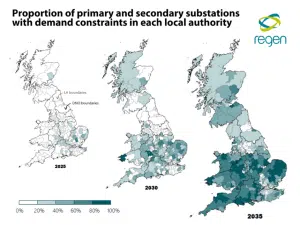Investing in local grid infrastructure should be a national priority – new report
Local grid upgrades need to become a critical infrastructure priority over the next 25 years if we are to meet our legally binding carbon budgets, according to a new paper from the MCS Foundation and energy analysts Regen.
While policymakers have recently focused on upgrading the national transmission network to make it ready for renewables, less thought has been put into investing in ‘local’ distribution networks – the cables that bring electricity into our homes and businesses. Currently there is significant spare capacity on these, even at peak demand. However, with the increased uptake of electric vehicles and heat pumps needed to meet net zero, almost half of all primary substations will be experiencing capacity constraints by 2035, says Regen.
The report, Electrification: The local grid challenge, follows much-publicised complaints from energy developers that renewables projects are being told to wait 15 years for a connection to the transmission network. The paper argues that distribution networks are just as critical – and says we should learn the lessons from the failure to invest in the transmission network earlier.
Unless Distribution Network Operators (DNOs) invest significantly to upgrade the electricity wires and substations that make up the distribution network in the next decade, the transition to net zero could stall and economic growth could be curtailed. As the map shows, constraints are expected to be widespread, with some regional variation in the timing of required upgrades.
However, Regen and the MCS Foundation stress that upgrades are possible, and that investing early will bring benefits for net zero and for the economy. The report recommends that Ofgem reforms price controls to require distribution networks to deliver long-term programmes of network upgrades in line with the demand forecasts set out in the forthcoming Regional Energy Strategic Plans. It also recommends improving grid flexibility, for example through smart homes, using electric cars and batteries to store electricity, and incentivising consumers to use electricity outside of peak times.

David Cowdrey, Director of External Affairs at the MCS Foundation, said: “Upgrading the grid must be an absolute priority for regulators and Government, and that includes primary substations and the low voltage distribution network, not just connections for power generation.
“Investment in the grid will need to be ramped up in the next decade to ensure that all local areas can get the connections and development they need. If this is not achieved, targets to install 600,000 heat pumps a year and sell millions of electric vehicles will be at risk.”
Merlin Hyman, CEO at Regen, said: “The wires that bring power to our homes are critical infrastructure for net zero, enabling us to charge our electric cars and run our heat pumps. Today, we have significant spare capacity on the local electricity network. However, we need to learn the lesson from the problems caused by the failure to invest in the transmission network. Regen is calling for reform of the way distribution network operators are regulated by Ofgem to put in place a long-term investment plan to be ready for the electrification of transport and heat.”
– ends –
Notes to editors
Link to the report here: https://mcsfoundation.org.uk/wp-content/uploads/2024/05/Electrification-The-local-grid-challenge-Regen-FINAL.pdf
Government analysis in 2022 found that, despite more investment in the grid needed for net zero, network charges per unit of energy are expected to stay within the 4-6p per kWh range and could even fall in the long term. This is because the grid will be delivering much more energy in the future – potentially as much as 800TWh a year in 2050, up from 275TWh today.
About the MCS Foundation
The MCS Foundation’s mission is to decarbonise homes, heat and energy. We were founded to oversee the MCS standards scheme which is run for public benefit and certifies the quality of renewables and their installation across UK homes. In addition, we support and develop programmes to address critical issues like retrofitting UK homes at scale, expanding the skills-base the sector needs, and commissioning independent research that informs and shapes better decision making to drive a carbon free future for all UK homes. For more information: https://mcsfoundation.org.uk/
About Regen
Regen is an independent not-for-profit centre of energy expertise and market insight whose mission is to transform the world’s energy systems for a zero-carbon future.
Lucy Galvin

Mobile; 07954 428437
Jamie Osborn

Mobile; 07975 881585